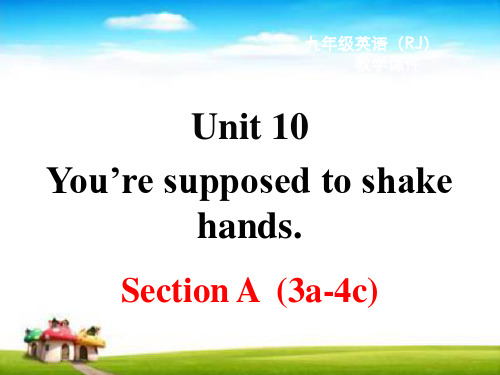英语人教版九年级全册第十单元第二课时
- 格式:doc
- 大小:25.00 KB
- 文档页数:3










课题:Unit 10 By the time I got outside, the bus had alreadyleft.课时:2nd课型:new 内容:p78 3a-3c主备教师:杨富强审核:谢海利牛俊芳李艳红李秀苹班级:姓名:学习目标:1.语言目标Learn to narrate past events.学会描述过去所发生的事情。
2、知识目标Learn to express something with Past Perfect Tense. 学习使用过去完成时态。
3、能力目标 Strengthen the consciousness of doing things regularly.做事加强连续性,有条不紊。
4、重难点:*重点单词rush, lock, empty, describe, farmer, marry基本要求:会读、会写、会用。
*重点短语go off, run off, on time, give sb. a ride, break down, show up, set off, get married, a piece of*基本要求:会读、会写、会用。
*重点语法(1)Past Perfect tense(过去完成时的用法):(2)“By the time”和“when”引导的时间状语从句基本要求:理解其含义,学以致用。
一、巧设引题:Have you ever been late for school? And have you ever been overslept? Why? Now let’s look at 3a—3c. I believe you will know the reason.二、指导自学1. The students try pronouncing these words by themselves76-77页单词速译@动词部分*发出声响 _____ ____ *冲,奔______ *跑掉,迅速离开____ ____ *锁上______ *停止运转______ ____@名词部分 *亲戚_________@词组 *准时____ ________2.Let’s close our books and fill in the following blanks.(quickly,quickly, quickly let’s see who fill in them most quickly.)①My teacher often tells me to get to school __ ______(准时).②I was late for school, because my alarm didn’t _____ _______(发出声响).三、合作探究1. My alarm clock didn’t go off, and by the time I woke up, my father had already gone into the bathroom and I had to wait for him to come out. (P78)我的闹钟坏了,因此等我醒来的时候,我父亲已经进去洗澡了,我只好等他出来。



Section A 2 (3a-3c)一、教学目标:1. 语言知识目标:1) 学习掌握下列词汇:relaxed, value, capital, noon, mad, effort, drop by, after all, get mad, make an effort2)复习be supposed to句型。
3)如何正确的阅读课文。
2. 情感态度价值观目标:1)通过“应该” 与“不应该”进一步了解一些国家的礼仪和对时间的看法。
2)了解不同国家的不同的时间观念,加强对中国文化的理解。
二、教学重难点1. 教学重点:1) 掌握本部分出现的生词和词组,达到熟练运用的目标。
2) 阅读短文,获得相关的信息。
通过阅读练习,来提高阅读能力。
2. 教学难点:1) 阅读短文,获得相关的信息的能力。
2) 理解并运用所学的词汇及表达方式。
三、教学过程Ⅰ. Warming up1. 师生问候。
2. 让学生展示上节课的演讲稿:各国礼仪的差异Ⅱ. Lead-in1. 展示一个哥伦比亚和瑞士风光的照片。
使学生熟悉这两个国家的情况,通过图片欣赏引出本节内容。
2. Look at the pictures and say something about the two countries.What do you know about Switzerland?What do you know about Colombia?Ⅲ. Reading1. Work on 3a: Tell Ss to read the article and answer the question:In which country is it OK to be 15 minutes late for dinner?Ss read the article quickly and try to find the answer to the question.2. 方法指导:首先,对原文材料迅速浏览,掌握全文的主旨大意。
速读全文,抓住中心主旨很有必要,在速读的过程中,应尽可能多地捕获信息材料。
其次,带着问题,再回到原文中去寻找、捕获有关信息。
做好这类题的要领是:1).明确题意,顺藤摸瓜。
2).按照要求,寻找答案来源。
3).找准关键词,明白其暗示作用。
4)再读课文,看答案是否符合题意。
3. 按指导的方法带着问题进行阅读。
4. 最后,教师让部分学生说出自己的答案,并校对答案。
Key: In Colombia.Ⅳ. Careful Reading1. Answer the questions according to the passages in 3a.1. Is it OK if people in Colombia arrive a bit late for a friend’s dinner?2. Who are pretty relaxed about time, Colombians or Swiss people?3. Colombians usually make plans to meet friends, don’t they?4. What are you supposed to do if you want to visit your friends in Switzerland?5. What do people in Switzerland think of time?V. Role-play 3cRole-play a conversation between Teresa and Marc. Teresa is late and Marc is mad.注意使用目标语言:In …, you’re supposed to…A: Hi, Marc. Sorry, I’m a little late.B: Teresa, you’re 10 minutes late!A: It’s just 10 minutes! It’s no big deal!B: Well, in Switzerland, you’re supposed to…VI. TalkingSay something about customs in Colombia and Switzerland about being on time and visiting friends.VII. Language points1. Where I’m from, we are pretty relaxed about time.Where I’m from是一个由“where” 引导的地点状语从句。
e.g. Just stay where you are. 就留在你原来的地方。
relaxed adj.放松的,自在的be relaxed about…对…感到放松e.g. Don’t be afraid, just be relaxed about the interview. 不要害怕,轻松面试。
You just need to be relaxed about this examination.你只要放松地面对考试就可以了。
2. We value the time we spend with our family and friends in our everyday lives.value v.珍视,重视e.g. I’ve always valued my teachers’ advice.我一直很重视老师们所给的建议。
life n.生活(可数名词)e.g. Many people make different kinds of friends in their social lives.许多人在他们的社交生活中结交了各种不同的朋友。
3. We often just drop by our friends’ homes.drop by 顺便拜访,e.g. Drop by my home this evening . 今晚到我家来谈谈。
4. We’re the capital of clocks and watches, after all!after all 毕竟e.g. So you see, I was right after all. 你看, 毕竟还是我对吧。
You decided to come after all. 你毕竟还是决定来了。
5. So I make an effort to be on time when I meet my friends.make an effort 做出努力e.g. I will make an effort to stop smoking. 我要尽力戒烟。
You should make an effort to improve your reading ability.你应该努力提高你的阅读能力.6. Also, we never visit a friend’s house without calling first.双重否定句。
never和without都表示否定,合在一起表达肯定意义,“一定会”。
e.g. You will hardly ever be able to speak good English without practicing.你不练习几乎是不可能把英语学好的。
VIII. ExercisesⅠ. Choose the correct answer.1. — How nice the music sounds!— It does! The peaceful music will make you feel _______.A. excitedB. boredC. movedD. relaxed【解析】D。
relaxed作形容词,“放松的、宽松的、轻松自在的”,可作表语、定语或宾语补足语。
作表语时,主语常为人。
2. People in Colombia needn’t make plans to meet their friends. They often just drop by their homes.A. give a ride toB. give up visitingC. forget to visitD. come over to【解析】D。
drop by “顺便看望(某人)、顺便到(某处)”, 用法同come over to。
Ⅱ. Complete the sentences.1. She seemed _______ (放松).2. He likes ___________ (拜访) his friend’s home on Sunday.3. —I’m sorry I didn’t do a good job.—That’s OK. You have tried your best ________ (毕竟).4. Beijing is the ______ (首都) of China.5. At _____ (正午), the sun is high in the sky.6. I got ____ (很生气的) with him for being late.Keys: relaxed, dropping by, after all, capital, noon, madHomeworkWrite a short passage about manners in Colombia and Switzerland in 80 words.。